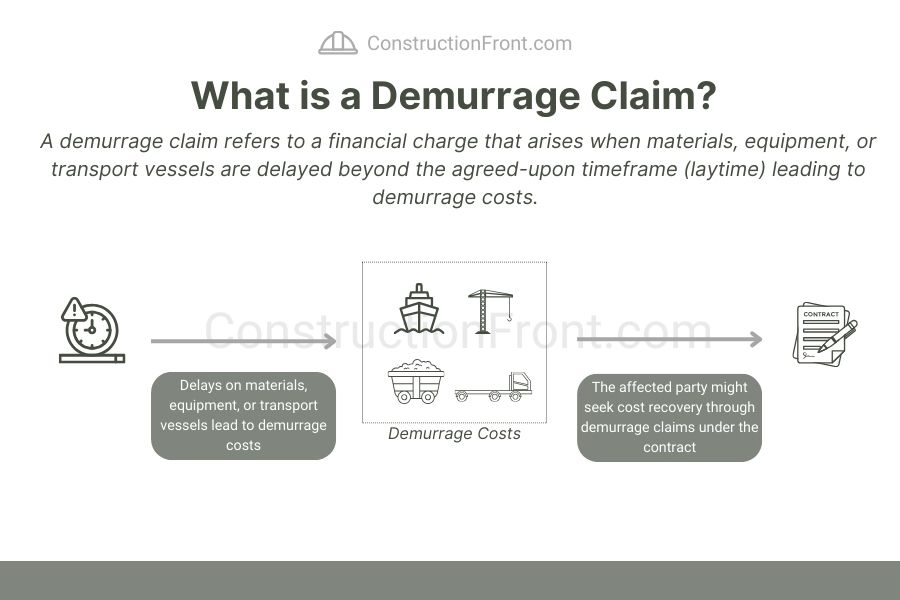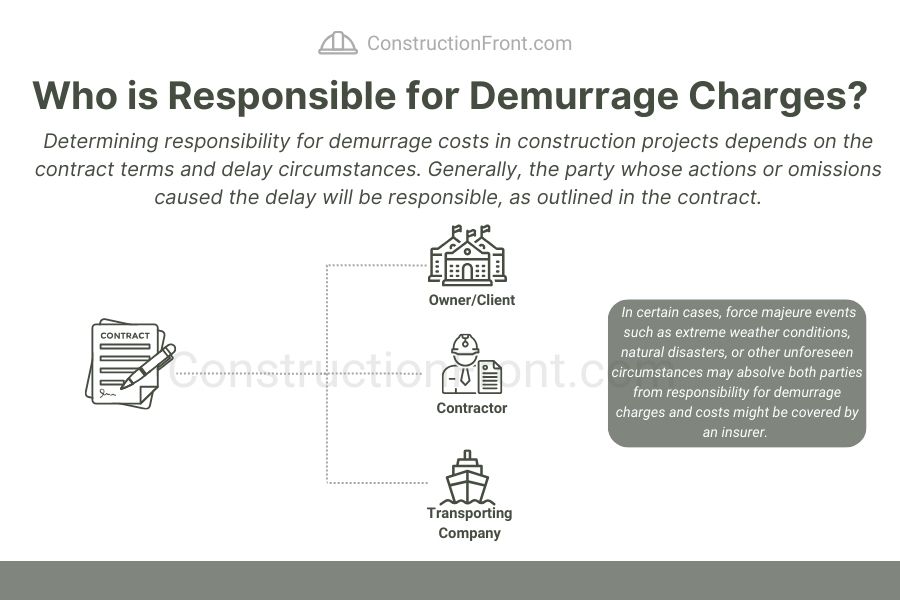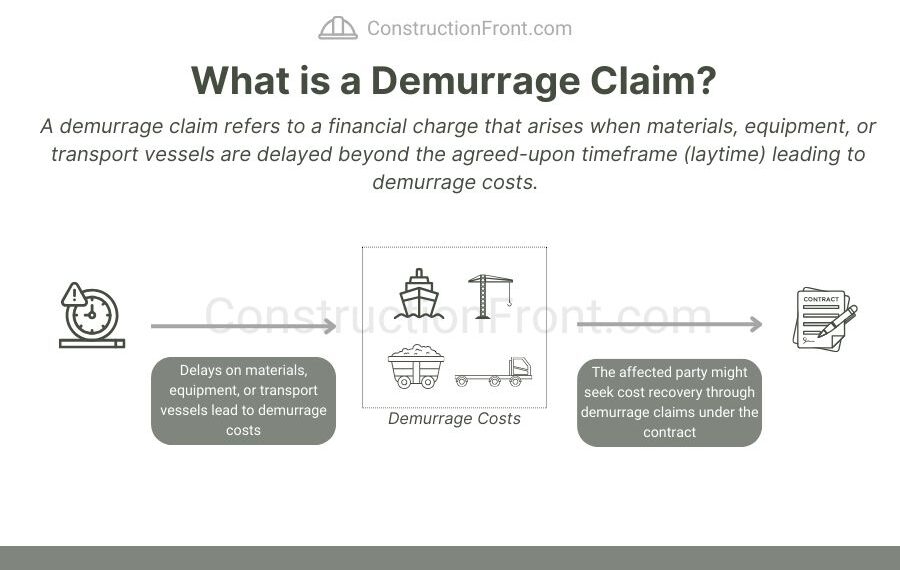Construction projects are full of unexpected challenges, from weather disruptions to supply chain delays. With multiple stakeholders involved and intricate logistics at play, even minor setbacks can have significant financial consequences, leading to distress for both project owners and contractors.
One common issue in projects with complex logistics is demurrage charges—costs incurred when materials, equipment, or transport vehicles are held up beyond the agreed timeframe. These charges can quickly escalate and lead to contractual disputes, such as variation claims or extension of time claims, and ultimately affecting budgets and schedules.
Understanding how demurrage claims arise, their impact on construction projects, and strategies to mitigate them is essential for engineers, contractors, and project managers looking to manage risk and ensure smooth project execution.
What is a Demurrage Claim?
A demurrage claim refers to a financial charge that arises when materials, equipment, or transport vessels are delayed beyond the agreed-upon timeframe (laytime) leading to demurrage costs. These delays often occur due to unforeseen circumstances, such as logistical challenges or site-related issues.
In construction projects, demurrage claims typically emerge when ships, trucks, or rented equipment are held up longer than the contractually allowed time. For example, a ship carrying steel beams may be delayed in unloading due to inefficiencies at the port, or a truck transporting precast concrete elements might be stuck waiting on-site because of a crane being unavailable.
Demurrage claims are especially common in large-scale projects with complex logistics, such as delivering wind turbines for wind farms, bulk materials for mining operations, or prefabricated structural components. These projects often involve tight schedules and coordination across multiple parties, increasing the potential for delays.

If not carefully managed, demurrage costs can quickly escalate and negatively impact the project budget, as well as contractual disputes around variation claims and/or extension of time claims. Therefore, it is crucial for engineers, contractors, and project managers to understand how these claims arise, their contractual implications, and how to mitigate risks.
What Typically Causes Demurrage Costs and Claims?
In construction projects, many factors can contribute/cause to demurrage claims, such as:
Cause of Demurrage Claims | Description | Example |
Delays in Site Readiness | When construction sites are not fully prepared to receive deliveries, causing unexpected delays and additional demurrage costs. | For instance, if the access road for a special truck carrying long wind turbine blades is not ready, the truck may have to wait for days or even weeks. |
Poor Coordination in Logistics | Inefficient scheduling of transport, unloading, or equipment handovers can cause unnecessary idle time, leading to delays and demurrage charges. | An example might be when a crane scheduled to offload precast concrete panels is unavailable due to miscommunication, causing the truck to wait longer. |
Customs and Regulatory Delays | Delays in customs clearance or regulatory approvals for imported construction materials can lead to extended waiting times and demurrage claims. | For example, if steel beams for a project are delayed at customs due to documentation issues, the shipping vessel may stay in port longer, incurring demurrage fees. |
Weather-Related Interruptions | Adverse weather conditions such as storms or extreme temperatures can delay unloading or storage, contributing to demurrage charges. | For instance, a wind turbine component that needs to be offloaded in a heavy storm may be delayed due to safety concerns, causing the transport vessel to accrue charges. |
Lack of Proper Documentation | Inadequate record-keeping can create confusion over when a delay occurred, leading to disputes and unnecessary demurrage charges. | An example could be when a material supplier fails to document the actual arrival time of a delivery, leading to confusion over when demurrage charges apply. |
Who is Responsible for Demurrage Charges?
Determining responsibility for demurrage costs in construction projects can often be complex, as it depends on the specific terms of the contract and the circumstances surrounding the delay. Ultimately, the party who will be responsible for demurrage costs will be determined by the contract between the parties. However, in general, the responsibility typically falls on the party whose actions or omissions caused the disruption or delay.
Here are some common scenarios:
Contractor or Subcontractor – In many cases, the contractor or subcontractor may be held responsible for demurrage costs if the delay is due to their failure to manage logistics effectively, ensure site readiness, or provide necessary equipment. For example, a Balance of Plant Contractor may be responsible for ensuring that a critical lay down area is ready on-site, and that the logistics are properly coordinated, which may include managing unloading times to avoid demurrage fees.
Owner or Client – Sometimes, the owner or client may be responsible for demurrage charges if delays occur due to their actions, such as failing to provide timely approvals, changes in project scope, or not clearing customs in time for the delivery of materials.
Shipping or Transport Companies – If the shipping company or transport provider is responsible for delays, either due to inefficiencies or other logistical issues within their control, they may bear the cost of demurrage.
Force Majeure Events – In certain cases, force majeure events such as extreme weather conditions, natural disasters, or other unforeseen circumstances may absolve both parties from responsibility for demurrage charges. However, clear documentation and communication are essential to ensure that such events are recognized, and the parties are not held accountable.

It’s important to note that in EPC contracts or other large-scale agreements, responsibility for demurrage charges is typically explicitly detailed in the contract. For instance, in a power plant project, the EPC contractor may be responsible for the mechanical assembly and erection of power plant parts, while the procurement of the plant itself could remain the client’s responsibility.
In such cases, delays in port logistics would typically be associated with the client, while delays in unloading the equipment on-site would normally fall under the responsibility of the EPC contractor, provided the contract specifies that unloading on-site is their duty. Clearly outlining these responsibilities in the contract is critical to avoid disputes.
Furthermore, proactive logistics coordination and risk management are essential to avoiding demurrage charges. For example, using early warning mechanisms under the contract can help anticipate potential project issues and mitigate risks before they escalate into costly delays.
Suggested Reading: What is an Early Warning Notice? (And How To Effectively Use them)
Are There Demurrage Insurances?
Yes, demurrage insurance is available and can be a valuable tool for managing the financial risks associated with delays in construction projects. However, it is important to note that demurrage insurance policies vary in terms of coverage, and they may not cover all types of delays.
In most cases, the specific terms and conditions of the policy will define what is covered, and exclusions may apply based on the causes of the delay (e.g., force majeure events or delays caused by the project team). Therefore, it is crucial to carefully review the policy and ensure it aligns with the project’s risks and logistics.
For example, some insurance policies may cover legal costs associated with potential disputes but may not extend to liquidated damages under the contract.
Demurrage Claim and Costs - FAQ
Demurrage Costs vs. Laytime - What is the Difference?
While both demurrage costs and laytime are related to delays in transport or shipping, they refer to different concepts.
Laytime refers to the agreed time allowed for the unloading or loading of materials, equipment, or cargo. It is specified in the contract, and during this time, no charges are incurred. Laytime is essentially the grace period allocated for the completion of these activities.
Demurrage costs come into play when the laytime is exceeded. If the unloading or loading process takes longer than the agreed laytime, the party responsible for the delay may incur demurrage charges. These costs are intended to compensate for the additional time that vessels, trucks, or equipment are tied up beyond the agreed schedule.
In short, laytime is the allotted period for loading or unloading, and demurrage costs are the charges incurred when that period is exceeded.
Demurrage Claims and Time Bars – What’s the Connection?
Time bars are clauses in contracts that set deadlines for submitting claims, including demurrage claims. If the claim is not made within the specified time, it may be time-barred and cannot be pursued.
For demurrage claims, this means that if a delay leads to additional costs, the party responsible must notify the other party within the contractual time frame, or they risk losing the right to claim those costs. Timely reporting is essential to avoid financial consequences.
Need Help with a Demurrage Claim?
Do not hesitate to contact us (click here) for specialised advice in the construction industry.
Sources
Disclaimer: The articles on this blog are for informational and educational purposes only and do not constitute legal advice. While we strive to provide accurate and up-to-date information on construction law, regulations may vary by jurisdiction, and legal interpretations can change over time.













